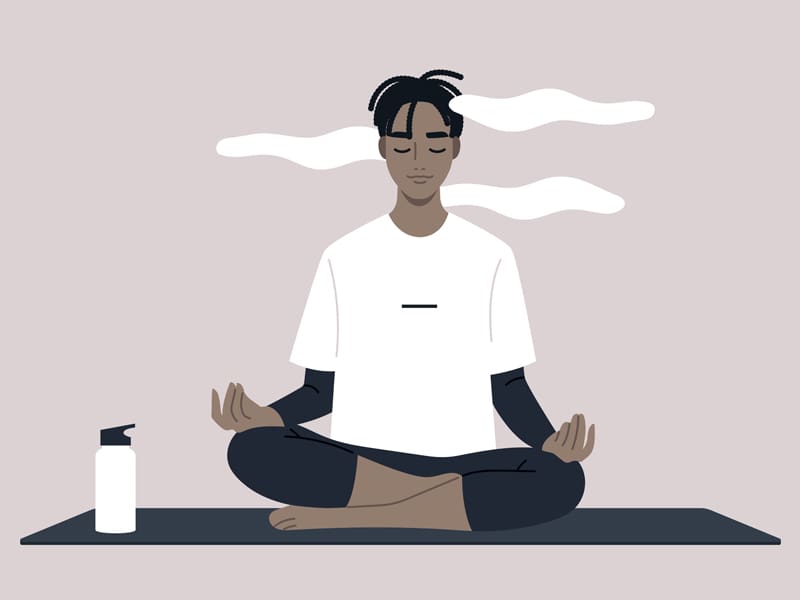You may have a dysregulated nervous system and not even know it. Here’s how to tell if you’re suffering from it, as well as steps to help you heal.
How to Heal a Dysregulated Nervous System and Other Stress Reduction Tips
Stress is an inevitable part of life, affecting us all in various ways. While many are familiar with how chronic stress can impact sleep, mood, and overall health, fewer people realize that prolonged stress can also lead to a dysregulated nervous system. When our autonomic nervous system–which is responsible for involuntary functions like heart rate and digestion–becomes imbalanced, it can result in a range of physical, emotional, and behavioral symptoms. This matters because keeping things in balance is crucial to your overall well-being.
Signs of a Dysregulated Nervous System
Recognizing the signs of a dysregulated nervous system is the first step toward healing. Symptoms can vary widely but often include chronic fatigue, muscle tension, and digestive issues on the physical side, while emotional symptoms might encompass anxiety, irritability, and mood swings. Behaviorally, you might notice signs such as difficulty concentrating or insomnia.
Fortunately, dysregulated nervous systems can be recalibrated by making a few lifestyle changes and practices.
Steps to Healing a Dysregulated Nervous System
- Mindfulness and Meditation
Mindfulness and meditation are powerful tools that can help rewire the brain, reduce stress, and promote a sense of calm. Simple mindfulness exercises such as mindful breathing or body scan meditations are excellent starting points. Additionally, utilizing guided meditation apps or videos can enhance your practice by providing structure and consistency.
- Breathing Techniques
Proper breathing is essential to regulating the nervous system. Techniques like diaphragmatic breathing, box breathing, and alternate nostril breathing can activate the parasympathetic response, helping to reduce stress and promote relaxation. Practice these techniques daily to see significant improvements.
- Quality Sleep
Quality sleep is essential for nervous system health and overall well-being. Improving your sleep hygiene involves establishing a consistent bedtime routine and creating a sleep-friendly environment that is cool, dark, and quiet. Good sleep practices can dramatically enhance how you feel and function.
- At-Home Remedies and Therapeutic Practices
There are also many effective at-home remedies and stress regulation practices. Music therapy, which involves listening to calming music, has been proven to lower stress levels and promote relaxation. Aromatherapy is also another fantastic option, especially when using scents like lavender, chamomile, or eucalyptus. You may also turn to wellness apps, such as BlissTrax, which are designed to help users manage stress more effectively.
- Nutrition
Nutrition plays a pivotal role in supporting nervous system health. Consuming a balanced diet rich in whole foods, fruits, vegetables, lean proteins, and healthy fats can make a substantial difference. Proper hydration and nutrition are key, so aim to limit stimulants and processed foods that can worsen nervous system dysregulation.
Other Ways to Reduce Your Stress
Outside of lifestyle changes, you can introduce new practices to your daily or weekly routine. In many cases, a change of pace can be exactly what you need to recenter and rejuvenate yourself both mentally and emotionally. That said, consider the following:
- Nature Treks: Spending time in nature has been shown to reduce stress and improve mental health. Activities such as hiking, gardening, or nature walks allow you to connect with the natural world and benefit from its calming effects. Try our walking meditation app.
- Creative Outlets: Engaging in creative activities can provide a sense of accomplishment and joy. Explore outlets like art, music, or writing to express yourself and reduce stress. Creative pursuits can be both therapeutic and fulfilling.
Healing a dysregulated nervous system takes time and consistency, but small, intentional steps can lead to significant improvements. Remember, you have the power to transform your stress into a healthier and more balanced life. By incorporating these practices into your daily routine, you can pave the way toward a more resilient and harmonious nervous system.
Stress less with 30 days of BlissTrax for free:
• Use our relaxing music app designed to change your brain from a state of chaos to calm
• Find focus and flow state without closing your eyes to meditate
• Download the BlissTrax app and reduce stress and anxiety today


